|
|
|
Sort Order |
|
|
|
Items / Page
|
|
|
|
|
|
|
| Srl | Item |
| 1 |
ID:
134840
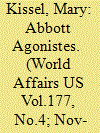

|
|
|
|
|
| Summary/Abstract |
You know things aren’t going well for conservative Australian Prime Minister Tony Abbott when the Institute of Public Affairs (IPA) in Melbourne, the country’s most prominent free-market think tank and formerly Abbott’s biggest cheerleader, takes out a full-page advertisement in the Australian newspaper to criticize him. Published on August 8th, the ad quotes Abbott from a speech he gave at the think tank two years earlier: “Freedom of speech is an essential foundation of democracy.” Then it continues: “We agree, Prime Minister. That’s why we will fight to repeal section 18C of the Racial Discrimination Act. Even if you won’t.”
|
|
|
|
|
|
|
|
|
|
|
|
|
|
|
|
| 2 |
ID:
134842


|
|
|
|
|
| Summary/Abstract |
In a brief, nationally televised announcement on August 7th regarding the Islamic State, which invaded the multicultural, northern Nineveh Province of Iraq this summer, President Obama observed that “these terrorists have been especially barbaric towards religious minorities, including Christian and Yazidis.”
|
|
|
|
|
|
|
|
|
|
|
|
|
|
|
|
| 3 |
ID:
134846
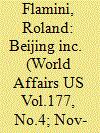

|
|
|
|
|
| Summary/Abstract |
This past Labor Day, a great many of the sausages consumed at cookouts across the country came from Smithfield Foods Inc., formerly the US food giant, but for the past year a wholly owned subsidiary of China’s Shuanghui International Holdings. Shuanghui paid $4.7 billion for Smithfield, whose operation spans hog farms and pork processing facilities in more than a dozen states, including Virginia, Maryland, North Carolina, and Wisconsin. The deal was China’s largest single investment in the United States to date, and helped boost Chinese mergers, acquisitions, and “greenfield projects” (companies setting up their own factories) to a record $14 billion by the end of 2013. Despite bilateral tensions over cyber espionage, Chinese territorial disputes with America’s allies in the South China Sea, and the slow progress of China’s massive economic reforms—and despite increasing calls for more scrutiny from Congress—China Inc closed a total of eight hundred and seventy-nine major deals last year across the American map, from New Jersey to California.
|
|
|
|
|
|
|
|
|
|
|
|
|
|
|
|
| 4 |
ID:
134845


|
|
|
|
|
| Summary/Abstract |
In the 1950s, when the communists came to power in both Vietnam and China, they warmly called each other “brothers,” affirming significant similarities of culture as well as ideological kinship. Over the years, however, attempts by Vietnam’s elder and stronger brother, China, to exert its authority have not always been accepted by its headstrong sibling. This filial defiance is rooted in a thousand years of Vietnamese resistance to attempts by Chinese feudal dynasties and their successor regimes to dominate it. Memories of that history and especially of the bloody nose the Vietnamese gave the People’s Liberation Army (PLA) in 1979, when it invaded to “teach Vietnam a lesson,” are central to understanding the relationship between the two countries today.
|
|
|
|
|
|
|
|
|
|
|
|
|
|
|
|
| 5 |
ID:
134839


|
|
|
|
|
| Summary/Abstract |
I recall a small, private Berlin dinner at which a senior official of the government of Chancellor Gerhard Schröder chastised me, the American guest, over Guantánamo. It showed an egregious disregard for international law among other things, the cabinet minister advised me. During the course of the evening, that same official also volunteered that, were the Guantánamo detainees on German soil, the Federal Republic would not know exactly what to do with them. This reminds me of the undiplomatic remark of a Berlin-based British diplomat from around the same time who quipped to me: “When Germans face a dilemma, they stare it in the face—then proceed to walk away, leaving the hardest choices for others.
|
|
|
|
|
|
|
|
|
|
|
|
|
|
|
|
| 6 |
ID:
134843
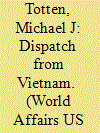

|
|
|
|
|
| Summary/Abstract |
Nearly forty years after the Vietnam War, Hanoi holds no grudges against the United States, in part because nearly all the country’s negative energy today is focused on China. And for good reason: China is big; it’s powerful; it’s right next door; and it has been hostile for two thousand years. Vietnam’s war with the US will never be repeated, but its long history of conflict with China, which is roughly as old now as Christianity, hasn’t been settled and might be revving up yet again.
|
|
|
|
|
|
|
|
|
|
|
|
|
|
|
|
| 7 |
ID:
134844
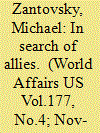

|
|
|
|
|
| Summary/Abstract |
During the Czech Republic’s first year of existence, most Czechs felt that nothing much had happened. True, there was now a new country east of the Morava River, where they had previously gone to hike and ski without the need of a passport. But nothing had changed within the Czech lands, Bohemia, Moravia, and a stump of Silesia. They were still there, as they had been for a thousand years, a country of milk and honey, hardworking, peaceful people, known around the world for their skills, intelligence, and culture.
|
|
|
|
|
|
|
|
|
|
|
|
|
|
|
|
| 8 |
ID:
134848
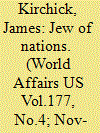

|
|
|
|
|
| Summary/Abstract |
Can there be any doubt that Israel is the most reviled country in the world today? No other nation engenders as much scorn, whether measured in newspaper column inches, street protests, or computer pixels. The only aspect of the hatred more disturbing than its virulent omnipresence is how out of proportion it is to Israel’s real (and alleged) wrongdoing. North Korea functions as a vast gulag, Syrian President Bashar al-Assad deploys chemical weapons on children, and the Castro brothers have ruled despotically over their Cuban island fiefdom for five decades running, but none of these dictatorial regimes invite anywhere near the scrutiny, never mind spittle-flecked loathing, engendered by the Jewish democratic state. A majority of Europeans, according to polls, consider this tiny country of eight million people to be the greatest threat to world peace. An Israeli soldier fires a rubber bullet in the West Bank and it will generate venomous crowds in cities around the globe; Iranian paramilitary basij forces murder peaceful demonstrators in broad daylight and the world emits barely a peep of protest.
|
|
|
|
|
|
|
|
|
|
|
|
|
|
|
|
| 9 |
ID:
134841
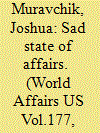

|
|
|
|
|
| Summary/Abstract |
The Gaza war of July and August 2014 occasioned the sharpest frictions in memory between the United States and Israel, highlighted by a cease-fire proposal offered by Secretary of State John Kerry that Israel’s security cabinet rejected unanimously. Kerry’s plan envisioned a seven-day cease-fire, during which the parties would negotiate “arrangements” to meet each of Hamas’s demands about the free flow of people and goods into Gaza and the payment of salaries of Hamas’s tens of thousands of employees. As for Israel’s demands about destruction of tunnels and rockets and the demilitarization of Gaza, these were not mentioned at all, except in the add-on phrase that the talks would also “address all security issues.”
|
|
|
|
|
|
|
|
|
|
|
|
|
|
|
|
| 10 |
ID:
134847
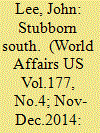

|
|
|
|
|
| Summary/Abstract |
While South Korean President Park Geun-hye has conferred with Chinese President Xi Jinping five times since 2013, most recently during a June 2014 summit in Beijing, she has refused several invitations to meet one-on-one with Japanese Prime Minister Shinzo Abe. Her excuse is that the Japanese leader and his country have not demonstrated sufficient and sincere remorse over Japanese actions during World War II and prior, such as the use of Koreans as “comfort women” for imperial Japanese soldiers. But the animosity is odd, in spite of this terrible past, since Japan and South Korea share a great power ally and protector in the United States and both are committed liberal democracies in a region where a nuclear-armed North Korea remains a major security threat. And the interests of both countries would be adversely affected if China changes the strategic and military balance in the region in a way that radically diminishes American power and influence.
|
|
|
|
|
|
|
|
|
|
|
|
|
|
|
|
|
|
|
|
|